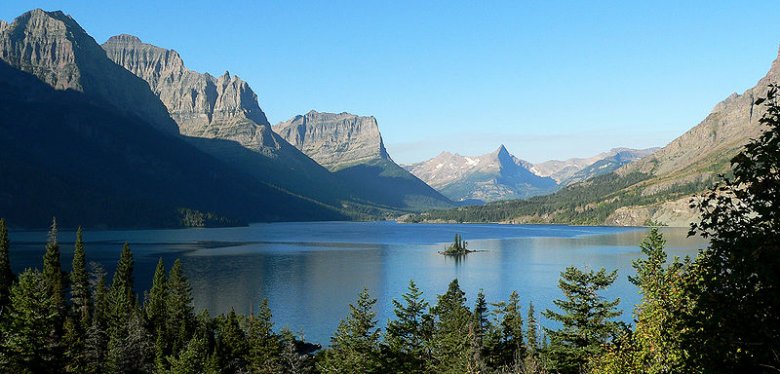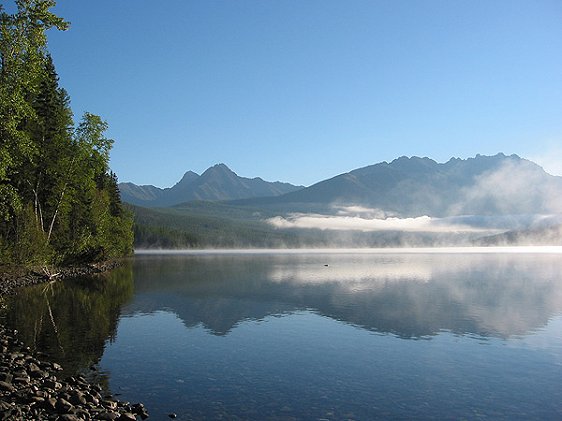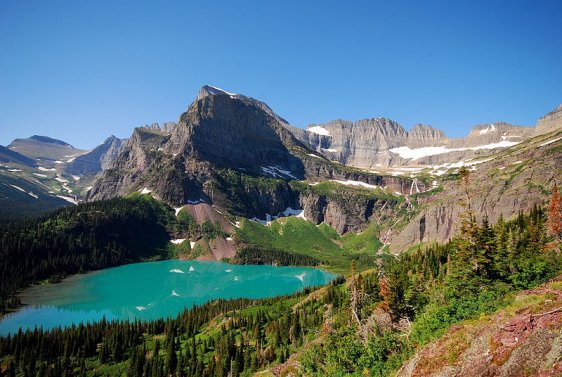
 Glacier National Park, Montana
Glacier National Park, Montana http://commons.wikimedia.org/wiki/File:St_Mary_Lake.jpg
http://commons.wikimedia.org/wiki/File:St_Mary_Lake.jpg Ken Thomas
Ken Thomas
Glacier National Park is a national park located in Montana. Covering 1,013,322 acres (4,101 sq km), it is across from Waterton Lakes National Park in Canada. The national park is part of the protected land encompassing 16,000 sq mi (41,000 sq km) that forms the "Crown of the Continent Ecosystem".
Glacier National Park covers an area of breathtaking beauty. The mountains here were formed some 170 million years ago. The many mountain lakes in the area were formed by glacial action which created the U-shaped valleys there.
 Chief Mountain, Glacier National Park
Chief Mountain, Glacier National Park http://commons.wikimedia.org/wiki/File:Chief_Mountain_snow.jpg
http://commons.wikimedia.org/wiki/File:Chief_Mountain_snow.jpg Astronautilus
Astronautilus
Early humans living in the area date back to some 10,000 years ago. Their descendants include various Native American tribes such as the Salish, Flathead, Shoshone and Cheyenne tribes. The Blackfeet tribe arrived in the area only in the 18th century to inhabit the eastern slopes of the area. Today the Blackfeet Indian Reservation is on the eastern border of the park while the Flathead Indian Reservation is to the west and south of the park.
In 1897, the area became a forest reserve, and on 11 May, 1910, President William Howard Taft turned it into a national park. It joins Waterton Lakes National Park of Canada to form the Waterton-Glacier International Peace Park, the world's first such park in 1932. Both parks were designated as Biosphere Reserves by the United Nations in 1976, and in 1995 were jointly inscribed as World Heritage Sites.
 Kintla Lake, Glacier National Park
Kintla Lake, Glacier National Park http://commons.wikimedia.org/wiki/File:Kintla_Lake_Fog.jpg
http://commons.wikimedia.org/wiki/File:Kintla_Lake_Fog.jpg Davis Restivo, NPS
Davis Restivo, NPS
Visiting Glacier National Park, Montana
The Going-to-the-Sun Road is a scenic road through Glacier National Park. Built it 1932, it crosses the Continental Divide at Logan Pass. It got its name from Going-to-the-Sun Mountain which dominates the eastbound view after Logan Pass. Spanning 53 miles (85 km) the road itself was designated a National Historic Landmark and a Historic Civil Engineering Landmark.The western entrance of the Going-to-the-Sun Road is off US Highway Route 2 near Kalispell, Whitefish and Cokumbia Falls, while the eastern entrance to the Going-to-the-Sun Road is off US Highway Route 89 at St Mary.
 Mount Gould behind Grinnell Lake, Glacier National Park
Mount Gould behind Grinnell Lake, Glacier National Park http://commons.wikimedia.org/wiki/File:Mount_Gould_from_Grinnell_Glacier_Trail_2.JPG
http://commons.wikimedia.org/wiki/File:Mount_Gould_from_Grinnell_Glacier_Trail_2.JPG Distress.bark
Distress.bark
Although the Glacier National Park is open around the year, winter weather means that the Going-to-the-Sun Road as well as other visitor facilities may be closed from September through May.
Vehicle permit for entering the Glacier National Park is $25 from 1 May through 30 November and $15 from 1 December through 30 April. Permits are valid for 7 days. The park is fee-free on Martin Luther King Jr Birthday, National Park Week, First Day of Summer, Public Lands Day and Veteran's Day weekend.
List of National Parks in the United States
 Latest updates on Penang Travel Tips
Latest updates on Penang Travel Tips
About this website

Dear visitor, thank you so much for reading this page. My name is Timothy Tye and my hobby is to find out about places, write about them and share the information with you on this website. I have been writing this site since 5 January 2003. Originally (from 2003 until 2009, the site was called AsiaExplorers. I changed the name to Penang Travel Tips in 2009, even though I describe more than just Penang but everywhere I go (I often need to tell people that "Penang Travel Tips" is not just information about Penang, but information written in Penang), especially places in Malaysia and Singapore, and in all the years since 2003, I have described over 20,000 places.
While I try my best to provide you information as accurate as I can get it to be, I do apologize for any errors and for outdated information which I am unaware. Nevertheless, I hope that what I have described here will be useful to you.
To get to know me better, do follow me on Facebook!
Copyright © 2003-2025 Timothy Tye. All Rights Reserved.

 Go Back
Go Back